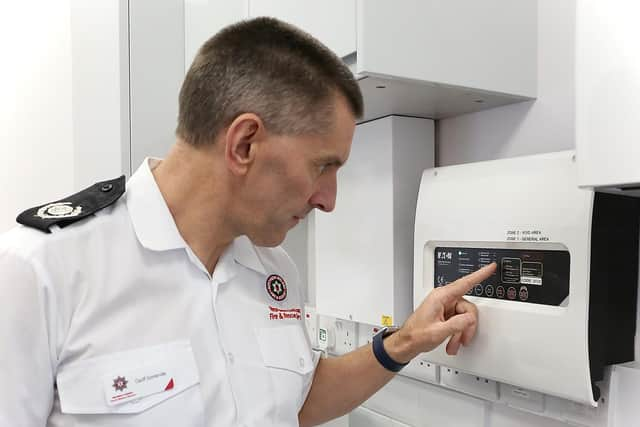Northern Ireland Fire & Rescue Service (NIFRS) stops responding to automatic alarms in commercial premises without human confirmation
and live on Freeview channel 276
In future, premises that are occupied and do not contain sleeping accommodation must verify there is a fire before contacting emergency services.
The new policy won’t impact residential settings, such as hospitals, care homes, hotels, and dwellings.
Advertisement
Hide AdAdvertisement
Hide AdHowever, it will affect commercial premises, such as factories, offices, and shops, altering how automatic fire alarms are handled.
The new Northern Ireland Fire & Rescue Service (NIFRS) policy is aimed at tackling the growing challenge of false alarms after the service said they had reached "unsustainable" levels.
From 2017 to 2022, 98.7% of automatic fire alarms in Northern Ireland were false alarms, with only a small proportion of the remaining 1.3% being actual fires.
NIFRS responded to a record number of false alarms in 2022, deploying 10,294 Fire Appliances in such cases
Advertisement
Hide AdAdvertisement
Hide AdAs a result, how NIFRS responds to automatic fire alarms will change with the new policy setting out specific responsibilities for fire alarm monitoring organisations, installers, maintainers, and users of fire alarm systems.


NIFRS Group Commander Geoff Somerville said: “If we receive reports of a fire or signs of fire we will always mobilise immediately to the premises.
“However, we are encouraging fire alarm monitoring organisations and property managers to investigate a fire alarm prior to calling Northern Ireland Fire & Rescue Service.
“NIFRS Regional Control Centre will dispatch the nearest resource if evidence of a fire is found or reported, but it is not legally obliged to respond to fire alarm signals if there is no fire or signs of a fire."
Advertisement
Hide AdAdvertisement
Hide AdIn future, the NIFRS response will depend on the type of premises and the information provided at the time of an emergency call.
Duty holders in premises that are occupied and do not contain sleeping accommodation will be required to verify there is a fire before contacting emergency services.
The policy will help ensure that Firefighters are available for actual emergencies, optimise the use of public funds, and reduce costs due to disruption and loss of productivity to businesses.
Advice for businesses on what to do next and how to reduce false alarms is available on the NIFRS website: www.nifrs.org/home/staying-safe/business-fire-safety/reducing-false-alarms